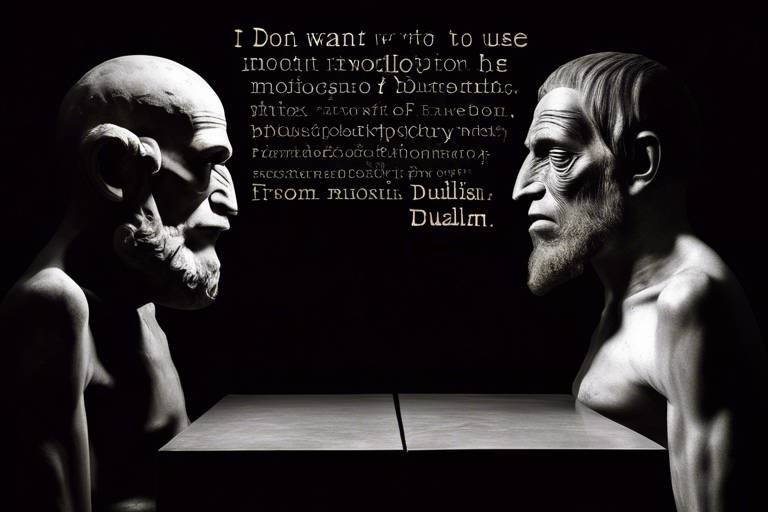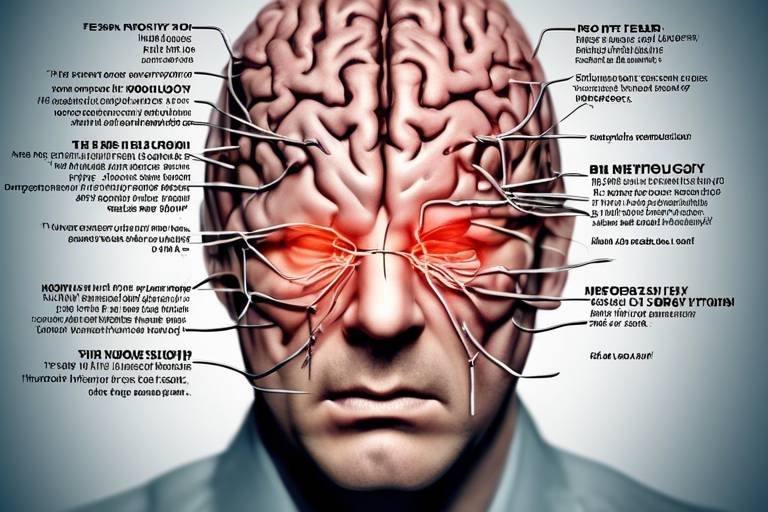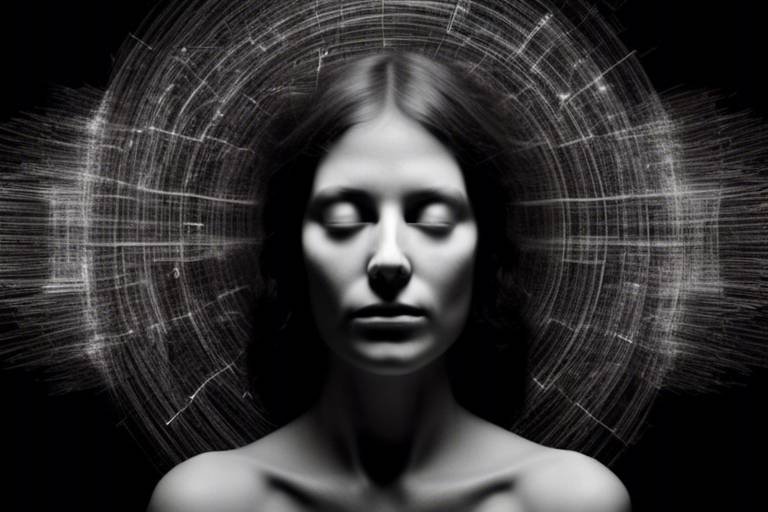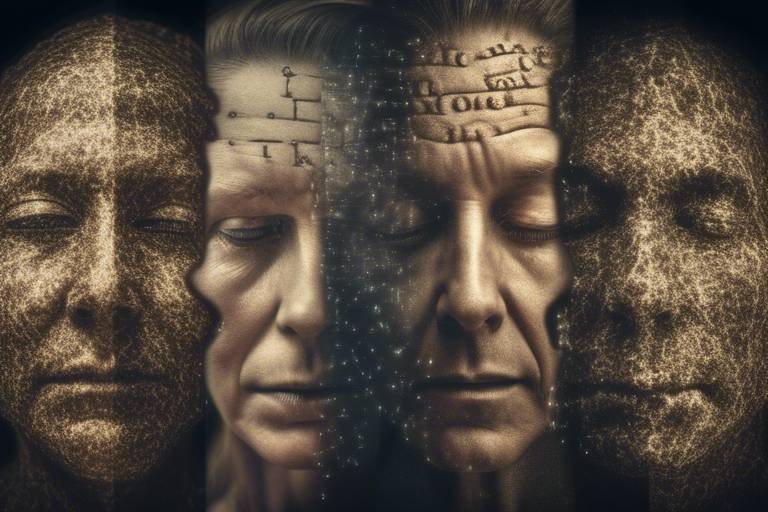The Role of Personal Identity in Consciousness
Have you ever wondered who you really are? What makes you, *you*? This question dives deep into the fascinating interplay between personal identity and consciousness. Our personal identity is not just a collection of memories or experiences; it is the very essence of how we perceive the world and ourselves. In this article, we will explore how personal identity shapes our consciousness, influencing our thoughts, emotions, and experiences. By understanding the nuances of identity, we can gain profound insights into the nature of consciousness itself.
At its core, personal identity encompasses the characteristics, beliefs, and experiences that define an individual. It is a tapestry woven from our past, present, and aspirations for the future. Philosophically, personal identity has been a subject of intense debate. Think about it: if you lost all your memories, would you still be the same person? This question leads us to explore various perspectives on personal identity, from philosophical to psychological viewpoints.
In the realm of philosophy, personal identity is often examined through the lens of continuity over time. Some argue that our identity is tied to our memories—after all, our memories shape our experiences and how we relate to others. Others contend that it is our physical body that anchors our identity. This dichotomy raises intriguing questions about the nature of consciousness. Are we merely the sum of our parts, or is there something more profound that connects us to our sense of self?
As we delve deeper into the theories of consciousness, we encounter a variety of perspectives, including dualism, physicalism, and panpsychism. Each of these theories offers a unique lens through which we can examine the relationship between personal identity and consciousness. For instance, dualism posits a separation between mind and body, suggesting that our consciousness exists independently of our physical form. This idea can significantly impact our understanding of personal identity, leading us to question whether consciousness is a byproduct of our physical existence or something more transcendent.
In the subsequent sections, we will explore these theories in detail, examining how they relate to our understanding of personal identity. We will also look at how memory plays a crucial role in shaping our identity, influencing our consciousness and, ultimately, our experience of life. Memory is not just a passive storage of information; it actively constructs our sense of self.
So, buckle up as we embark on this journey to uncover the intricate relationship between personal identity and consciousness. By the end of this exploration, we hope to leave you with a richer understanding of what it means to be human and how our identities shape our conscious experiences.
- What is personal identity? Personal identity refers to the characteristics and experiences that define an individual, encompassing memories, beliefs, and physical attributes.
- How does memory influence personal identity? Memory plays a crucial role in shaping our sense of self by allowing us to recall past experiences that inform our current identity.
- What are the main theories of consciousness? The primary theories include dualism, physicalism, and panpsychism, each offering different perspectives on the relationship between mind and body.
- Can memory loss affect personal identity? Yes, memory disorders such as amnesia can significantly alter an individual's self-perception and sense of identity.

Understanding Personal Identity
Personal identity is a complex and multifaceted concept that refers to the unique characteristics, experiences, and memories that define an individual. It's not just about your name or your physical appearance; it encompasses your beliefs, values, relationships, and the stories you tell about yourself. Think of personal identity as a tapestry woven from various threads of experience, each contributing to the overall picture of who you are. This intricate fabric is influenced by a variety of factors, including cultural background, personal experiences, and social interactions.
From a philosophical standpoint, personal identity raises intriguing questions. What makes you, *you*? Is it your memories, your consciousness, or perhaps something more abstract? Philosophers have long debated this topic, with different schools of thought offering various interpretations. For example, some argue that our continuity of consciousness is what preserves our identity over time, while others emphasize the importance of physical continuity—essentially, the idea that as long as our body remains intact, we remain the same person.
Psychologically, personal identity is closely tied to self-concept and self-esteem. How you perceive yourself can significantly influence your thoughts and emotions. For instance, if you see yourself as a creative person, you're more likely to engage in creative activities, which can enhance your sense of identity. Conversely, negative self-perceptions can lead to feelings of inadequacy and confusion about one's identity. This interplay between self-perception and identity is crucial for understanding how we navigate the world around us.
In addition, personal identity is not static; it evolves over time. Life experiences, relationships, and even societal changes can reshape our understanding of who we are. For example, a person may identify strongly with their cultural heritage during childhood, but as they grow older and experience new environments, their identity may expand to incorporate new influences. This fluidity highlights the dynamic nature of personal identity and its role in shaping our consciousness.
Ultimately, understanding personal identity is essential for grasping the broader implications of consciousness. By recognizing the various elements that contribute to our sense of self, we can better appreciate how our identities shape our thoughts, emotions, and interactions. Whether through philosophical inquiry or psychological exploration, delving into the nuances of personal identity offers valuable insights into the human experience.

Theories of Consciousness
When we dive into the mysterious waters of consciousness, we encounter a variety of theories that attempt to explain this complex phenomenon. These theories offer different lenses through which we can understand not just consciousness itself, but also how it intertwines with our personal identity. At the heart of this exploration are three major theories: dualism, physicalism, and panpsychism. Each of these theories provides a unique perspective on the relationship between mind and body, and consequently, on how our identity is shaped.
Dualism posits a fundamental separation between the mind and the body. This perspective suggests that our consciousness exists independently of our physical form. Think of it like a software program running on a computer; even if the hardware fails, the software can exist elsewhere. This idea leads us to ponder: if our consciousness can exist apart from our physical selves, what does that mean for our identity? Are we merely our thoughts and experiences, or is there something more?
On the other hand, physicalism argues that everything, including consciousness, can be understood through physical processes. This theory suggests that our thoughts and feelings are simply the result of biochemical reactions in our brains. Imagine consciousness as a beautiful painting; physicalism would assert that every brushstroke, every color, is a physical reaction occurring within the canvas of our brain. This raises intriguing questions about personal identity: if our consciousness is merely a product of physical processes, how do we account for the continuity of our identity over time?
Then we have panpsychism, a somewhat radical theory that posits that consciousness is a fundamental aspect of all matter. According to this view, everything—from rocks to humans—possesses some form of consciousness. This theory can be likened to a vast ocean where every drop of water has its own experience. In this sense, our personal identity is not just a human trait but a universal characteristic shared across all forms of existence. This perspective can be both enlightening and perplexing, as it challenges our traditional notions of individuality.
As we navigate through these theories, it becomes evident that they each offer valuable insights into understanding consciousness and personal identity. However, they also leave us with more questions than answers. For instance, if dualism is correct, what happens to our identity after death? If physicalism holds true, how do we reconcile the rich tapestry of our experiences with mere biological processes? And if panpsychism is valid, what does that mean for our sense of self in relation to the universe?
The interplay between these theories not only shapes our understanding of consciousness but also influences how we perceive our own identities. As we continue to explore these profound questions, it is essential to recognize that our understanding of consciousness is still evolving. Each theory contributes to a broader dialogue about what it means to be human, how we relate to the world around us, and how our identities are formed and transformed through our conscious experiences.
- What is consciousness? Consciousness refers to the state of being aware of and able to think about one's own existence, thoughts, and surroundings.
- How do personal identity and consciousness relate? Personal identity shapes our consciousness by influencing our thoughts, feelings, and perceptions, which in turn affect how we understand ourselves.
- What are the main theories of consciousness? The main theories include dualism, physicalism, and panpsychism, each providing different explanations for the nature of consciousness.
- Can consciousness exist without a physical body? Dualism suggests that consciousness can exist independently, while physicalism argues that consciousness is a product of physical processes.

Dualism and Personal Identity
Dualism is a fascinating philosophical perspective that proposes a clear distinction between the mind and the body. This separation raises intriguing questions about how we define personal identity. If our mind can exist independently of our physical body, what does that mean for our sense of self? This dualistic view suggests that our thoughts, emotions, and consciousness are not merely products of physical processes but rather exist in a realm of their own. In this context, personal identity becomes an intricate tapestry woven from both mental and physical threads, sparking debates that have persisted for centuries.
One of the most compelling aspects of dualism is how it allows for the possibility of an enduring self, one that transcends the physical changes our bodies undergo throughout life. Imagine a river, constantly flowing yet retaining its identity. Similarly, dualism posits that despite the changes in our body—aging, injury, or even death—our consciousness may persist, maintaining a sense of who we are. This perspective invites us to ponder: if our identity is tied to our consciousness, what happens to that identity if our physical form ceases to exist?
To further explore this relationship, we can consider the implications of dualism on personal identity through the lens of psychological experiences. For instance, when we encounter profound emotional events, our responses can shape our identity in ways that are not solely linked to our physical state. Think about how a traumatic experience might alter your perception of yourself. In dualistic terms, this shift in self-perception emphasizes the significance of the mind in defining who we are, suggesting that our consciousness plays a pivotal role in the construction of personal identity.
However, dualism is not without its critics. Many argue that the mind cannot exist independently of the body, positing that our thoughts and consciousness are fundamentally rooted in our physical existence. This perspective challenges the notion of a separate identity and raises questions about the very essence of what it means to be human. Critics argue that if our consciousness is merely a byproduct of brain activity, then personal identity is a fluid construct, constantly evolving with our experiences and biological changes.
In light of these discussions, it becomes evident that dualism and personal identity are intertwined in complex ways. The dualistic perspective encourages us to consider the profound implications of consciousness on our sense of self, while also inviting critical examination of the relationship between mind and body. This ongoing dialogue not only enriches our understanding of personal identity but also opens the door to exploring the depths of human experience.
As we continue to navigate these philosophical waters, one thing remains clear: the interplay between dualism and personal identity is crucial in shaping our understanding of consciousness. It challenges us to reflect on our identities and consider how our thoughts, emotions, and experiences contribute to the essence of who we are.
- What is dualism? Dualism is a philosophical view that posits a separation between the mind and body, suggesting that they are distinct entities.
- How does dualism affect personal identity? Dualism implies that personal identity may persist beyond physical changes, as it is rooted in consciousness rather than just the physical body.
- What are some critiques of dualism? Critics argue that the mind cannot exist independently of the body, proposing that consciousness is a byproduct of physical processes.
- Why is the relationship between memory and identity important? Memory plays a crucial role in shaping our sense of self, influencing how we perceive our identities over time.

Descartes' Viewpoint
René Descartes, a towering figure in the realm of philosophy, is often hailed for his profound contributions to our understanding of personal identity and consciousness. His famous declaration, "Cogito, ergo sum" (I think, therefore I am), encapsulates his belief in the primacy of the mind over the body. Descartes proposed that the mind, a non-physical entity, is distinct from the body, which is composed of physical matter. This dualistic approach has significant implications for how we perceive personal identity.
According to Descartes, the essence of our identity lies in our capacity for thought and self-awareness. He argued that while our bodies may change and decay over time, our minds remain constant, allowing us to maintain a continuous sense of self. This raises a fascinating question: if our physical forms can alter dramatically, what truly defines who we are? Descartes believed that it is our thoughts, memories, and consciousness that form the core of our identity, independent of our bodily existence.
To further illustrate Descartes' viewpoint, consider the following key elements of his philosophy:
- Mind-Body Distinction: Descartes posited that the mind and body are fundamentally different substances, leading to the idea that consciousness is not bound by physical constraints.
- Self-Awareness: He emphasized that our ability to reflect on our thoughts and experiences is what truly makes us who we are.
- Continuity of Identity: Descartes argued that even if we forget certain memories or experience changes in our physical state, our identity remains intact as long as we can think and reflect.
However, Descartes' dualism has not gone unchallenged. Critics argue that this separation of mind and body overlooks the intricate ways in which our physical states can influence our mental processes. For instance, consider how a lack of sleep can affect our mood and cognitive abilities. This interdependence suggests that perhaps our identity cannot be so easily compartmentalized into the mental and physical realms.
Despite the critiques, Descartes' influence on contemporary discussions surrounding consciousness and identity remains profound. His ideas have laid the groundwork for various philosophical inquiries and debates, inviting us to ponder the fundamental nature of our existence. As we navigate the complexities of personal identity, Descartes' emphasis on the mind's role continues to provoke thought and inspire further exploration into what it means to be truly conscious.

Critiques of Dualism
The concept of dualism, which posits a distinct separation between mind and body, has been a topic of intense debate among philosophers and scientists alike. Critics argue that this perspective oversimplifies the intricate relationship between our mental states and physical existence. One of the primary critiques is that dualism fails to provide a satisfactory explanation for how the mind and body interact. If the mind is non-physical, how can it influence physical actions? This question has puzzled thinkers for centuries and remains a significant challenge to dualist theories.
Moreover, dualism often leads to a problematic view of human identity. By separating the mind from the body, it creates a dichotomy that can undermine the holistic understanding of the self. For instance, consider the experience of pain. When someone feels pain, it is not just a mental experience; it is deeply rooted in physical sensations. Critics argue that dualism ignores the fact that our thoughts, emotions, and consciousness are inextricably linked to our physical bodies. This interconnectedness is essential for understanding personal identity and consciousness as a unified experience.
Another critique stems from advancements in neuroscience, which suggest that many mental processes can be traced back to physical brain activity. Research indicates that changes in brain states can directly affect our thoughts and emotions, challenging the dualist assertion that the mind exists independently of the body. For example, studies have shown that altering brain chemistry through medication can significantly change a person's mood and behavior, indicating a strong connection between physical processes and mental states.
Furthermore, critics point out that dualism can lead to ethical and moral dilemmas. If we view the mind as separate from the body, it may lead to a lack of accountability for physical actions, as individuals could claim that their mental states do not reflect their true selves. This perspective can complicate issues related to mental health, criminal behavior, and personal responsibility.
In light of these critiques, many philosophers and scientists advocate for a more integrated approach to understanding personal identity and consciousness. This perspective suggests that our mental experiences cannot be divorced from our physical realities. By embracing a holistic view, we can better appreciate the complexity of human identity and the multifaceted nature of consciousness.
In summary, while dualism has played a significant role in shaping our understanding of the mind-body relationship, its limitations have prompted many to seek alternative theories that account for the interconnectedness of mental and physical experiences. As we continue to explore the depths of consciousness, it becomes increasingly clear that a more unified approach may provide the insights we need to understand the essence of personal identity.
- What is dualism? Dualism is a philosophical perspective that posits a separation between the mind and body, suggesting that they are distinct entities.
- Why do critics argue against dualism? Critics argue that dualism oversimplifies the relationship between mind and body, fails to explain their interaction, and overlooks the role of neuroscience in understanding consciousness.
- How does memory relate to personal identity? Memory plays a crucial role in shaping our sense of self, as our experiences and recollections contribute significantly to our identity.
- Can memory disorders affect personal identity? Yes, memory disorders can profoundly impact personal identity, as loss of memory can lead to changes in self-perception and continuity of the self.

Physicalism and Personal Identity
Physicalism is a philosophical perspective that asserts everything in existence, including consciousness, can be understood through physical processes and properties. This view has profound implications for our understanding of personal identity. When we think about personal identity, we often consider the traits, memories, and experiences that make us who we are. But what if all of these elements are merely manifestations of our physical brain and body? This question opens up a fascinating discussion about the intersection of physicalism and personal identity.
At its core, physicalism suggests that our thoughts, emotions, and consciousness arise from the complex interactions of neurons and biochemical processes in the brain. This leads to the idea that our identity is not a separate, immaterial essence but rather a byproduct of our physical state. If we consider our identity as being tied to our brain's functioning, it raises intriguing questions about what happens when our physical state changes. For example, if someone undergoes significant brain surgery or develops a neurological condition, how does that impact their sense of self? Are they still the same person, or has their identity shifted?
One of the critical aspects of physicalism is its emphasis on the continuity of the physical body. It posits that personal identity is largely linked to the persistence of the physical organism over time. This continuity is often described through the concept of the biological organism, where the identity of a person is tied to their physical existence from birth to death. However, this raises another question: if our physical bodies change, such as through aging or medical interventions, does that mean our identity is also in flux?
To further illustrate this point, consider the following scenarios:
- Brain Injury: A person who suffers a traumatic brain injury may experience changes in personality, memory, and behavior. Are they still the same individual they were before the injury?
- Memory Alteration: If memories can be altered or erased through medical procedures, how does this affect one's identity? If a person forgets significant life events, do they lose a part of themselves?
- Transplant Surgery: In cases where individuals receive organ transplants, there are anecdotal reports of changes in personality or preferences. Does this suggest that our identity is more than just our brain?
These scenarios highlight the complexity of linking personal identity solely to physicalism. Critics argue that while physical processes are essential, they do not fully account for the subjective experience of identity. For example, the emotional and psychological aspects that shape our self-perception might not be entirely reducible to physical explanations. This leads to an ongoing debate about the nature of consciousness and the essence of what it means to be 'you.'
In summary, physicalism offers a compelling framework for understanding personal identity through the lens of physical processes. However, it also invites us to ponder deeper questions about the nature of self and consciousness. Are we merely the sum of our physical parts, or is there something more profound that defines our identity? As we continue to explore these questions, the interplay between physicalism and personal identity remains a rich field for philosophical inquiry.
- What is physicalism? Physicalism is the view that everything, including consciousness, can be explained by physical processes and properties.
- How does physicalism relate to personal identity? Physicalism suggests that our identity is tied to our physical state, including our brain and body, rather than an immaterial essence.
- Can personal identity change? Yes, changes in physical state, such as brain injury or memory loss, can impact one's sense of self and identity.
- What are some challenges to physicalism? Critics argue that physicalism may not fully account for the subjective experiences and emotional aspects that shape our identity.

The Impact of Memory on Identity
Memory is not just a collection of past experiences; it is the very fabric that weaves together our sense of self. Think about it: when you recall a cherished moment from your childhood, it’s not merely a recollection; it’s a thread that connects you to who you were and, in many ways, who you are today. Our memories shape our beliefs, influence our emotions, and even guide our decisions. Without memories, would we even have a coherent identity? This question leads us to explore how memory intricately impacts personal identity and consciousness.
At its core, memory can be divided into two primary types: episodic memory and semantic memory. Episodic memory refers to the ability to recall specific events or experiences from our lives, complete with the context of time and place. For instance, remembering your first day at school or a birthday party involves episodic memory. On the other hand, semantic memory encompasses the general knowledge we acquire over time, such as facts, concepts, and the meanings of words. Both types of memory contribute significantly to our identity. Without episodic memories, our personal narratives would lack depth, while without semantic memories, we would struggle to understand the world around us.
Moreover, the relationship between memory and identity is not merely theoretical; it has profound implications in real life. For example, consider individuals with memory disorders, such as amnesia. These conditions can lead to significant changes in self-perception and identity. When someone loses their memories, they often struggle to recognize themselves, leading to a fragmented sense of self. This phenomenon raises important questions: If our memories define who we are, what happens to our identity when those memories are stripped away? In many cases, individuals may feel as though they are living as a stranger in their own bodies, disconnected from their past and the experiences that shaped them.
To illustrate the impact of memory on identity further, let's consider the following table that summarizes the effects of different types of memory on personal identity:
| Type of Memory | Description | Impact on Identity |
|---|---|---|
| Episodic Memory | Recalling specific personal experiences | Shapes personal narratives and emotional connections |
| Semantic Memory | General knowledge and facts | Provides context and understanding of the world |
| Procedural Memory | Skills and tasks learned through repetition | Contributes to self-efficacy and identity through competence |
As we delve deeper into the nature of memory, it becomes evident that our identities are not static; they are fluid and continually evolving. Each new experience adds layers to our identity, while forgotten memories can create gaps that may alter how we perceive ourselves. This dynamic interplay between memory and identity invites us to consider how we can cultivate and preserve our memories. Engaging in activities that promote memory retention, such as journaling or storytelling, can help reinforce our sense of self.
In conclusion, the impact of memory on identity is profound and multifaceted. It shapes our perceptions, influences our relationships, and ultimately defines who we are. As we navigate through life, it is essential to recognize the importance of our memories in constructing our identities. After all, every moment we experience contributes to the rich tapestry of our lives, reminding us that we are not just the sum of our memories; we are the stories we tell ourselves and the connections we forge along the way.
- How does memory loss affect personal identity? Memory loss can lead to a fragmented sense of self, making it challenging for individuals to connect with their past experiences.
- What are the different types of memory? The main types of memory include episodic memory, semantic memory, and procedural memory, each playing a unique role in shaping identity.
- Can memories be reconstructed? Yes, memories can be reconstructed or altered over time, which can impact how we perceive our past and ourselves.

Memory Theories
Memory is a fascinating and complex aspect of human consciousness, intricately linked to our personal identity. It’s not just about remembering past events; it’s about how those events shape who we are today. There are several theories that delve into the nature of memory, each offering unique insights into how we construct our identities based on our experiences. Two key theories stand out: episodic memory and semantic memory.
Episodic memory refers to the recollection of specific events and experiences from our lives. Think of it as a personal diary that captures the details of your first day at school or your last vacation. These memories are often vivid and emotional, allowing us to relive moments that have significantly impacted our lives. They contribute to our self-narrative, helping us understand our journey and the choices we’ve made along the way.
On the other hand, semantic memory encompasses the general knowledge we acquire throughout our lives, independent of personal experience. It’s like a library of facts and concepts—everything from knowing that Paris is the capital of France to understanding the principles of physics. While semantic memory doesn’t hold the emotional weight of episodic memory, it still plays a crucial role in shaping our identity by providing us with the context and framework through which we interpret our experiences.
To illustrate the differences between these two types of memory, consider the following table:
| Type of Memory | Description | Examples |
|---|---|---|
| Episodic Memory | Memory of specific events and experiences | Your wedding day, a birthday party |
| Semantic Memory | General knowledge and facts | Knowing the capital cities, mathematical formulas |
Both episodic and semantic memories are essential for our sense of self. They intertwine to create a rich tapestry of who we are. For instance, when you think about your childhood, you might recall specific events (episodic) and also the general knowledge you gained during that time (semantic). This blend of memories helps us navigate our lives and understand our place in the world.
However, it’s important to recognize that memory is not infallible. Our recollections can be influenced by various factors, including emotions, time, and even the way we tell our stories. This malleability of memory can lead to distortions, which raises questions about the reliability of our personal identity. If our memories shape who we are, what happens when those memories change or fade?
In conclusion, memory theories highlight the profound connection between our experiences and our identity. By understanding the distinctions between episodic and semantic memory, we gain deeper insights into how our past shapes our present self. As we continue to explore the complexities of memory, we uncover the intricate ways in which our consciousness is formed and informed by the stories we carry within us.
- What is the difference between episodic and semantic memory? Episodic memory involves personal experiences, while semantic memory consists of general knowledge and facts.
- How does memory impact personal identity? Our memories shape our self-narrative and influence how we perceive ourselves and our experiences.
- Can memories change over time? Yes, memories can be influenced by emotions and external factors, leading to distortions in how we recall past events.

Memory Disorders and Identity
Memory is the bedrock of our personal identity; it shapes our experiences, influences our emotions, and ultimately defines who we are. When we encounter memory disorders, such as amnesia, the impact on personal identity can be profound and disorienting. Imagine waking up one day and not recognizing your own reflection in the mirror—this is the reality for many individuals grappling with memory loss. Their past, which forms the tapestry of their identity, becomes frayed and difficult to grasp.
Amnesia, for instance, can stem from various causes, including traumatic brain injuries, strokes, or psychological factors. It is crucial to understand that memory disorders can lead to a disconnection from one's past, which can alter self-perception. Individuals may struggle to recall significant events, relationships, or even their own names. This loss can create a sense of emptiness, as if a vital part of their identity has been stripped away. The emotional turmoil that accompanies such experiences can lead to anxiety, depression, and a profound sense of loss.
Research has shown that memory plays a critical role in maintaining a continuous sense of self. Our memories are not just random snippets of information; they are intertwined with our emotions and experiences, creating a narrative that is uniquely ours. When this narrative is disrupted, it can lead to a fragmented sense of identity. For example, someone suffering from retrograde amnesia may retain memories formed after the onset of the disorder but lose access to memories that came before. This can create a paradox where the individual feels like a stranger to themselves.
Moreover, memory disorders can also affect how individuals relate to others. Relationships are built on shared experiences and mutual memories. When someone loses the ability to recall these shared moments, it can create emotional distance and confusion. Friends and family members may find it challenging to connect with someone who no longer remembers the life they once shared. This can lead to feelings of isolation for both the individual and their loved ones.
Interestingly, some studies suggest that while memory loss can alter identity, it does not erase it entirely. Individuals may still retain core aspects of their personality, values, and preferences, even in the absence of specific memories. This raises intriguing questions about the nature of identity: Is it solely based on our memories, or is there an inherent self that persists regardless of what we can recall?
In conclusion, memory disorders profoundly impact personal identity, highlighting the intricate relationship between our memories and our sense of self. As we continue to explore the complexities of consciousness and identity, it becomes evident that preserving and understanding our memories is essential for maintaining a coherent sense of who we are.
- What is the role of memory in personal identity?
Memory plays a crucial role in shaping our experiences and self-perception, forming the narrative of our lives. - How do memory disorders affect relationships?
Memory disorders can create emotional distance and confusion in relationships, as individuals may struggle to recall shared experiences. - Can identity persist despite memory loss?
Yes, individuals may retain core aspects of their personality and values even when specific memories are lost.
Frequently Asked Questions
- What is personal identity?
Personal identity refers to the unique characteristics and experiences that define an individual. It's a complex concept that encompasses our memories, beliefs, and values, all of which shape how we perceive ourselves and relate to the world around us.
- How does personal identity influence consciousness?
Personal identity significantly impacts consciousness by shaping our thoughts, emotions, and experiences. The way we view ourselves can alter our perception of reality, affecting how we respond to different situations and interact with others.
- What are the main theories of consciousness?
There are several theories of consciousness, including dualism, physicalism, and panpsychism. Each theory offers a different perspective on how consciousness arises and its relationship to personal identity, with dualism suggesting a separation between mind and body, while physicalism argues that everything can be explained through physical processes.
- How does memory affect personal identity?
Memory plays a crucial role in shaping personal identity. Our memories help form our sense of self and influence how we perceive our past experiences. Without memories, our identity can feel fragmented or incomplete, leading to a disconnection from who we believe we are.
- What are episodic and semantic memory?
Episodic memory refers to the recollection of specific events and experiences from our past, while semantic memory involves the recall of general knowledge and facts. Both types of memory contribute to our personal identity by providing context and continuity to our experiences.
- Can memory disorders change personal identity?
Yes, memory disorders such as amnesia can significantly alter personal identity. When individuals lose their memories, they may struggle to maintain a coherent sense of self, leading to confusion about who they are and how they relate to others.
- What is dualism, and how does it relate to personal identity?
Dualism is the philosophical view that the mind and body are separate entities. This perspective suggests that our consciousness and personal identity are not solely tied to our physical existence, allowing for a more nuanced understanding of what it means to be an individual.
- Why do some critics argue against dualism?
Critics of dualism argue for a more integrated view of mind and body, suggesting that consciousness cannot be fully understood without considering the physical processes that underpin it. They believe that personal identity is more closely linked to our biological and psychological states than dualism allows.



















